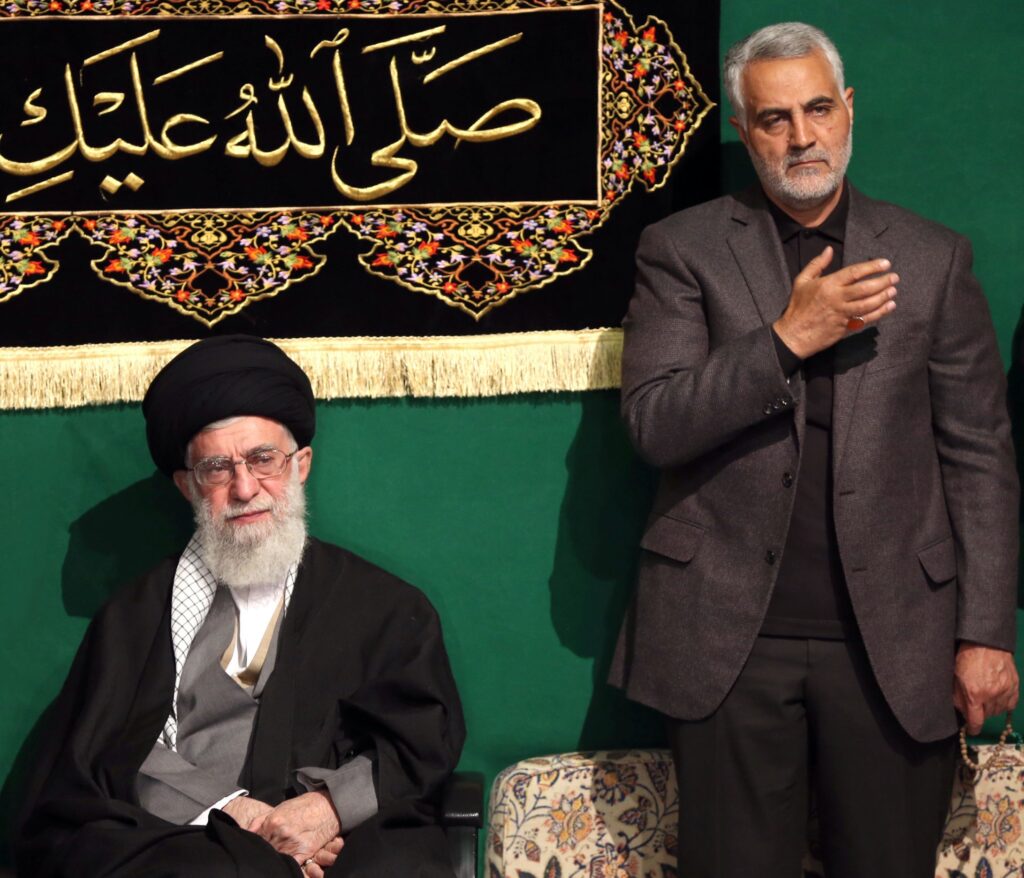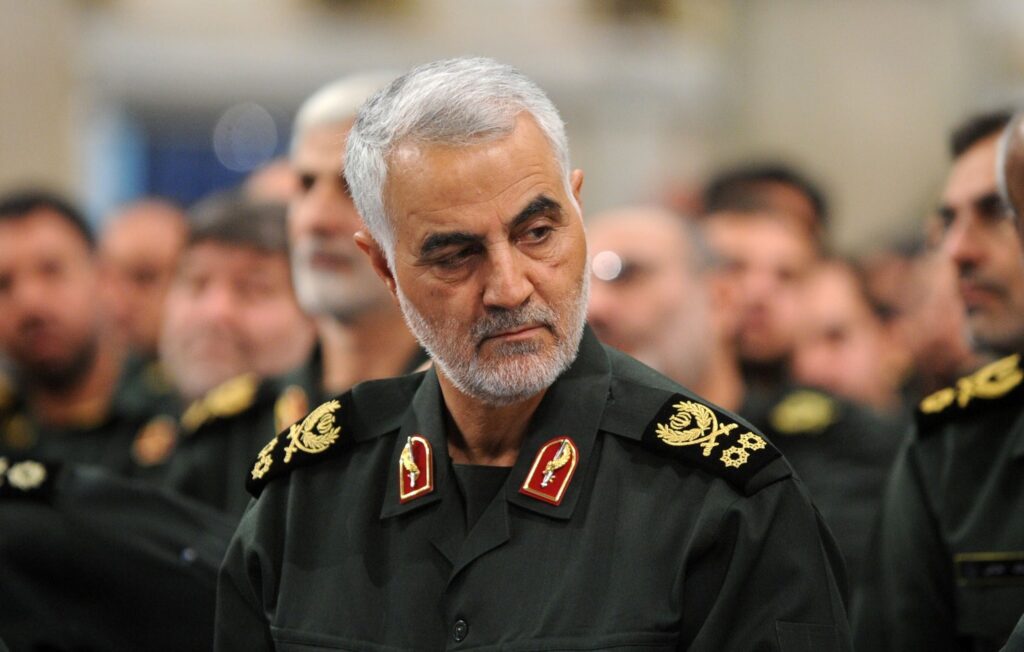By ARIE EGOZI and COLIN CLARK
TEL AVIV: Five days ago, an undisclosed intelligence agency intercepted a telephone call made by the head of Iran’s Quds Force, Maj. Gen. Qassem Soleimani, in which he was heard ordering his proxies in Iraq to attack the U.S embassy in Baghdad, as well as other Israeli and American targets, with the aim of taking hostages, Israeli sources say.
It’s unclear whether this was a lapse in tradecraft on the part of the usually savvy Soleimani or whether the notorious Iranian military leader’s phone calls were being routinely intercepted. Nor is it clear whether it was the US or another foe of Iran that made the intercept. Regardless, the intelligence seems to have led directly to Soleimani’s killing yesterday, which has thrown the Mideast into uproar.
Sources here say that Soleimi flew in the Airbus A-320 plane operated by Cham Wing, Flight 6Q501, which took off from Damascus at 10:30 pm and landed in Baghdad minutes before midnight. Minutes later, what are presumed to have been Hellfire missiles fired from a Predator struck and killed everyone in two cars that had picked up Suleimani and other passengers from the flight.
A large ring the Iranian military leader wore helped “forces on the ground” to immediately and positively identify Suleimani’s body. The strike also killed Abu Mahdi Muhandis, deputy commander of the Iranian-backed militias known as the Popular Mobilization Forces, or PMF. Iran has confirmed both men were killed. During the US attack, sources here say US fighter aircraft were airborne to handle any immediate Iranian reaction.
The US announced this morning it was deploying 3,500 additional troops of the 82nd Airborne to the Mideast, joining 750 Airborne soldiers flown earlier this week to Kuwait. That brings the 82nd’s presence in the region to a full infantry brigade. The rapidly deployable paratroop unit keeps a “ready brigade” on alert at all times for just such crises.
Meanwhile, undisclosed numbers of US Special Operations Forces arrived in Jordan. The first elements arrived in Jordan aboard CV-22 tilt rotor aircraft that had been refueled by C-130J. They landed before the strike in the Baghdad airport. The first explanation was that the Americans want to be ready for a hostage situation following the attack by pro-Iranian militias on their embassy in Baghdad.
All this is in addition to 100 heavily armed and specially trained Marines airlifted to the US Embassy in Baghdad. The Marines traditionally provide security for US embassies.
Israel also reacted promptly to the news. Its military is on high alert. Israeli Prime Minister Benjamin Netanyahu cut short a visit to Greece after receiving online briefings while in Athens. The Mount Hermon ski resort near the Syrian border was closed on Jan 3.
The assessments in Israel are that Iran will not retaliate immediately, but will weigh its course, and may well continue the current strategy, awaiting the results of the US election in November and, in the meantime, try to minimize the economic damage and threat to the regime’s survival. If Donald Trump remains In the White House, Iran is believed likely to negotiate changes in its nuclear agreement with the powers.
An analysis by Roman Schweizer of the Cowen Washington Research Group, who follows defense stocks, offers a grim prognosis of the successful strike: “President Trump’s decision to kill a key Iranian military official could set off a chain of retaliatory strikes on U.S. personnel and assets across the Middle East and globally. To be clear, this is the equivalent of Iran killing the US Chairman of the Joint Chiefs of Staff or the Director of the Central Intelligence Agency and then taking credit for it.”

Ayatollah Khamaeini and Qassem Soleimani of Iran
The first glimmers of an active response to the strike ordered by President Trump has come from the Iranian-backed Yemeni Houthi rebels, who threatened to respond “promptly and swiftly.” A strike from such a quarter would be a classic Iranian move, using proxy forces to deflect blame and ensure its efforts to drive change in the region remain paramount.
A response is also likely from Iranian-backed Shia militias in Iraq, which have in the past fought both against the US and the Iraqi government and alongside them against the Sunni extremists of the Islamic State. Many Iraqis are deeply conflicted about Iran’s outsized influence in their country, even among the Shia majority. But most factions are even more sensitive to US intrusions on Iraqi sovereignty and united to condemn the unilateral US strike just outside of Baghdad International Airport , which also killed a prominent Iraqi Shia militia leader. In addition to the expected outcry from Iranian proxies, the attack was denounced by Shia leaders who’ve sought some degree of independence from Tehran, including Prime Minister Adel Abdul Mahdi, firebrand cleric Moqtada al-Sadr, and the country’s moderate Grand Ayatollah, Ali al-Sistani, who called for restraint on all sides.
The airline carrying the Iranians, Cham Wings, is a private Syrian company with its head office in Damascus. It was sanctioned by the US Treasury Department three years ago because “Cham Wings has cooperated with Government of Syria officials to transport militants to Syria to fight on behalf of the Syrian regime and assisted the previously-designated Syrian Military Intelligence (SMI) in moving weapons and equipment for the Syrian regime, including by utilizing a relationship with another Syria-based airline, FlyDamas (FDK, Damascus).” On top of that, Treasury said, “Cham Wings’s Damascus-Dubai Int’l flight was one of the main routes SMI used to launder money throughout the region, with SMI paying all parties involved to ensure they would continue to do business with the Assad regime.”
Meanwhile, Washington political leaders reactions were muted and mixed, with most Democrats expressing varying forms of worry and concern about Iran’s reaction and most Republicans expressing resolve and support for President Trump’s action. One strain was persistent and worth noting — both parties said clearly and repeatedly the US does not seek war with Iran.
The chair of the House Armed Services Committee, Adam Smith, did not condemn the killing but said he remains “troubled about the impact this action will have on the safety and security of United States’ personnel and assets in the region. Rather than calming the strained tensions in the region, this action will only accelerate the cycle of violent escalation.”
He called on the Trump administration to “clearly articulate how this action, and potential future actions, will protect U.S. global interests while ensuring the safety and security of our personnel in the region and worldwide. The American people deserve to know why President Trump has brought us to the brink of another war and under what authorization.”
House Speaker Nancy Pelosi, speaking soon after the strike was announced, made clear congressional leaders had not been briefed on the strike beforehand — not even the so-called Gang of 8– and called for an immediate briefing for “the full Congress.”
Meanwhile, Democratic Sens. Dick Durbin and Tim Kaine introduced a war powers resolution to force a debate and vote in Congress to prevent further escalation into full-blown conflict with Iran. The resolution requires that any hostilities with Iran must be explicitly authorized by a declaration of war or specific authorization for use of military force, but does not prevent the United States from defending itself from imminent attack.
“The Senate must not let this President march into another war in the Middle East without authorization from Congress,” Durbin said in a statement this evening.
War powers resolutions are privileged, meaning that the Senate will be forced to vote on the legislation.
Smith’s Senate counterpart, James Inhofe, said in a statement that “America does not and should not seek war, but it will respond in kind to those who threaten our citizens, soldiers and friends — as the President has long promised. De-escalation is preferable and possible — but only if our adversaries choose it.”
Colin Clark and Sydney Freedberg contributed from Washington.

No comments:
Post a Comment